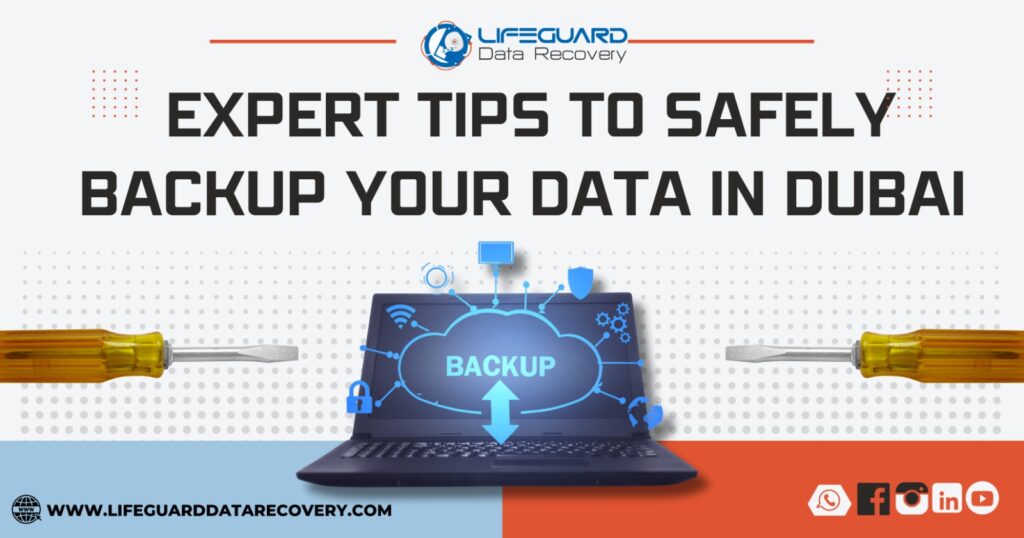Expert Tips to Safely Backup Your Data in Dubai and Ensure Business Continuity
Welcome to Dubai, the buzzing metropolis that never sleeps! As a business owner in this fast-paced city, you understand the importance of staying ahead of the game and ensuring business continuity. One critical aspect of that is safeguarding your valuable data through proper backup measures. In this article, we’ll provide you with expert tips on how to safely backup your data in Dubai, so you can have peace of mind and focus on what matters most – your business.
Dubai is a hub for innovation and technological advancements, and as such, it offers a wide range of options for backing up your data securely. From cloud-based solutions to physical storage, we’ll explore the best practices and tools available to protect your data against unexpected events or cyber threats.
By implementing effective backup strategies, you can ensure that your business operations are not disrupted in the event of data loss or system failures. So, whether you’re a small startup or a large enterprise, join us on this journey to discover how to keep your data safe and achieve seamless business continuity in the vibrant city of Dubai.
The Importance of Data Backup for Businesses in Dubai
In today’s digital age, data is the lifeblood of businesses. It contains vital information such as customer details, financial records, intellectual property, and operational data. Losing this data can have severe consequences, ranging from financial loss to damaged reputation. That’s why data backup is crucial for businesses in Dubai.
Dubai is known for its rapid growth and dynamic business environment. With numerous industries and sectors thriving in this city, the amount of data generated daily is staggering.
From e-commerce platforms to financial institutions, every business relies on data to function effectively. Therefore, it is essential to have a robust backup system in place to protect against data loss caused by hardware failures, cyber-attacks, or natural disasters.
Data backup ensures that even if your primary data storage becomes compromised, you can easily recover it from a secondary source. By implementing regular backup practices, you can minimize the risk of losing critical information, maintain business continuity, and meet regulatory compliance requirements. Let’s now explore the common risks and threats to data in Dubai.
Lost Your Data!
Talk To Data Recovery Expert in Dubai for Free Consultation
Common Risks and Threats to Data in Dubai
Dubai’s position as a global business hub attracts cybercriminals seeking to exploit vulnerabilities in various sectors. Understanding the risks and threats to your data is the first step in developing an effective backup strategy.
Cyber Attacks:
With the increasing reliance on digital systems, cyber-attacks have become a significant concern for businesses in Dubai. Malware, ransomware, and phishing attempts can compromise your data and disrupt your operations. It is crucial to have backup measures in place to recover your data in case of such attacks.
Hardware Failures:
Despite advancements in technology, hardware failures can still occur. Hard drives can crash, servers can malfunction, and power outages can result in data loss. Regular backups provide a safety net, allowing you to restore your data quickly and minimize downtime.
Natural Disasters:
While Dubai may not be prone to natural disasters like earthquakes or hurricanes, it is still susceptible to occasional flooding, power surges, and extreme weather conditions. These events can damage your infrastructure and lead to data loss. Off-site backups are essential to ensure your data remains safe in the face of such disasters.
Human Error:
Mistakes happen, and employees can accidentally delete or overwrite important data. Having backups that capture the state of your data at regular intervals can help you recover from such incidents without significant consequences.
Now that we have identified the risks and threats, let’s explore the different methods of data backup available in Dubai.
Different Methods of Data Backup
When it comes to data backup, there is no one-size-fits-all solution. The method you choose depends on factors such as the size of your business, the amount of data you generate, and your budget. Let’s discuss the various options available for data backup in Dubai.
1. Cloud-based Data Backup Solutions
Off-site Storage:
By storing your data in the cloud, you eliminate the risk of physical damage or loss due to local disasters. Your data is securely stored in multiple data centers, ensuring redundancy and availability.
Automated Backups:
Cloud backup services often provide automated scheduling, allowing you to set up regular backups without manual intervention. This ensures that your data is always up to date and protected.
Scalability:
Cloud backup solutions are highly scalable, allowing you to increase or decrease your storage capacity as needed. This flexibility is particularly beneficial for businesses with fluctuating data storage requirements.
Ease of Access:
With cloud backup, you can access your data from anywhere with an internet connection. This is especially useful for businesses with remote teams or those that require frequent data access while on the go.
When selecting a cloud backup provider in Dubai, consider factors such as
- data encryption,
- data center locations, and
- the provider’s reputation for security.
It is essential to choose a reputable and reliable service provider to ensure the safety of your data.
Data Backup Frequency and Scheduling
Data backup frequency and scheduling play a crucial role in ensuring the safety and availability of your data. Regular backups are essential to minimize the risk of data loss and to ensure that you can restore your systems to a previous state if needed. The frequency of your backups will depend on the volume and criticality of your data, as well as your business requirements.
One common approach is to schedule daily backups for critical data, such as financial records, customer information, and important documents. For less critical data, weekly or monthly backups may be sufficient. It’s important to strike a balance between the frequency of backups and the resources required to perform them.
It’s also worth considering the best time to schedule backups to minimize disruptions to your business operations. For example, you may choose to perform backups during non-peak hours or outside of regular working hours. This ensures that your systems are available to your employees and customers when they need them the most.
Another important aspect of data backup scheduling is the retention period. How long should you keep your backups? This will depend on various factors, such as legal requirements, industry regulations, and your specific business needs. For example, if you operate in a highly regulated industry, you may need to retain backups for a longer period to comply with data retention laws. It’s crucial to understand and adhere to any applicable regulations to avoid potential legal and compliance issues.
In summary, determine the frequency of your backups based on the criticality of your data, schedule them at the most convenient time for your business, and establish an appropriate retention period to meet your legal and operational requirements. By doing so, you’ll have a solid foundation for safeguarding your data and ensuring business continuity.
Testing and Verifying Your Data Backups
Creating backups is only the first step in ensuring the safety of your data.
Testing the backup
The next crucial step is to regularly test and verify the integrity and usability of your backups. Without proper testing, you run the risk of discovering that your backups are incomplete, corrupted, or unusable when you need them the most.
Testing your backups involves restoring the data from your backup storage to a test environment and verifying that everything functions as expected. This process helps identify any potential issues or gaps in your backup strategy and allows you to make necessary adjustments before a real data loss event occurs.
Partial Restoring the data
One common approach to testing backups is to perform a partial restore of a subset of your data and verify its integrity. This can be done by comparing the restored data with the original source data to ensure consistency. You can also test the restoration process by simulating different scenarios, such as recovering data to a different system or in a different location.
Verifying usability of backup
In addition to testing the integrity of your backups, it’s essential to verify their usability. This involves ensuring that you can successfully restore your data within an acceptable time frame and that it is accessible and usable by your systems and applications. You should also test the restoration of different types of data, including databases, files, and configurations, to cover all aspects of your business operations.
Regularly testing and verifying your backups is crucial to maintain confidence in your data protection strategy. It allows you to identify and address any issues that may arise, ensuring that your backups are reliable and ready to be used when needed. By investing time and resources in testing, you significantly reduce the risk of data loss and increase your chances of achieving seamless business continuity.
Conclusion: Ensuring Business Continuity through Effective Data Backup
In the fast-paced and competitive business landscape of Dubai, ensuring business continuity is paramount. Safeguarding your valuable data through proper backup measures is a crucial step towards achieving this goal. By leveraging the wide range of backup solutions available in Dubai, you can protect your data from unexpected events or cyber threats, enabling your business to thrive.
In this article, we explored expert tips on how to safely backup your data in Dubai. We discussed the importance of data backup frequency and scheduling, emphasizing the need for regular backups tailored to your business requirements. We also highlighted the significance of testing and verifying your backups to ensure their integrity and usability.
Remember, data loss can happen at any time, and the impact on your business can be significant. By following the expert tips provided in this article and implementing a robust backup strategy, you can minimize the risk of data loss and ensure that your business operations continue uninterrupted.
So, whether you choose cloud-based solutions, physical storage, or a combination of both, make data backup a top priority in your business. Invest in reliable backup tools, regularly test your backups, and stay up to date with the latest backup technologies and best practices.
With the right backup strategy in place, you can have peace of mind knowing that your valuable data is safe and that your business is well-prepared to face any challenges that may come its way. So, take action today and safeguard your data in Dubai for a future of seamless business continuity.





















